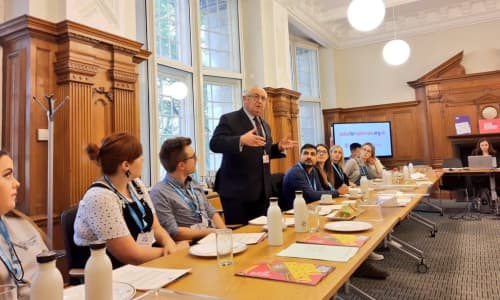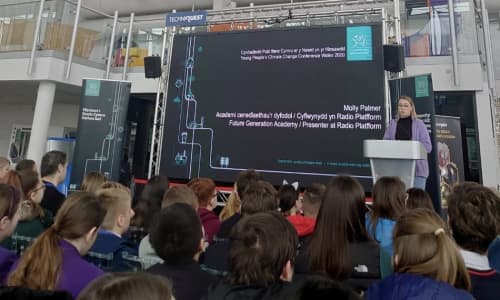Molly Palmer from our Radio Platfform team recently graduated as a member of the Future Generations Leadership Academy. Here's Molly in her own words writing about her extraordinary experiences at the Academy.
Where was I when I received the phone call asking me how I felt about representing Wales Millennium Centre on the Future Generations Academy alongside other young Welsh leaders?
Well, funnily enough, I wasn’t in Wales. I was in London. And what’s even funnier is that I would find myself back in the city less than two months later being 1/10th of the first ever Welsh delegation to represent Wales at the One Young World Summit alongside other delegates from all four corners of the World.
All I can say is that, at the very least, this has been one massive whirlwind of a journey!

When I joined the Academy, I honestly had no idea what to expect. If I’m honest, I had never even heard of the Well-Being of Future Generations Act, however, over the last 12 months I have come to learn how unique the Act is and also how leadership across the world has a long way to go.
I first met my fellow Academy participants just before we went to London. One thing I noticed instantly was how clever everyone was. Sat to my right was Emily-Rose, a geo-technical engineer at Transport for Wales and to my left Chris, an environmental officer for Natural Resources Wales.
The first thing I asked myself was “How can someone who works in a radio station possibly collaborate with someone who works as an engineer? What relevance could I bring to this vital subject?” All I knew was that I had this amazing opportunity to make change, so I grabbed it with both hands.
Over the last 12 months we have travelled up and down Wales participating in workshops to improve our leadership skills and enhance what knowledge we already have about leadership. As I mentioned, we attended the One Young World Summit where it was refreshing to find ourselves among thousands of like-minded people.

Now that Coronavirus has hit us, the Academy is looking a bit different. However, during the pandemic, we have spoken to many different leaders, and we have seen these leaders having to put their money where their mouth is and lead in ways that they’ve never had to before.
From Michael Sheen to Jeremy Miles MS. A definite highlight for me was being invited as a guest speaker to the Environmental Conference that Welsh Government held back in March. It was an amazing experience to share the stage with the one and only Richard Parks and inspire young people, reassuring them of the power they hold.
During this process I have really come into my own. It’s influenced my personal choices from fashion to food and professional choices such as how I work with my wonderful colleagues.
I’ve learnt to look at everything with a critical eye and ask myself, “How can this be improved to be more sustainable/inclusive/progressive?” and the list goes on.
The fact is we all have a duty to do our bit to make sure that we leave the world a better place than which we found it.
You don’t have to be the perfect example of sustainability, but reducing your use of water, buying less plastic, walking where possible, taking part in community projects such as litter picking and generally being kinder to one another go a long way.

Something that has stuck with me throughout this Academy is the idea that in order to solve the current leadership crisis, we need to be reflecting on previous leadership.
When we look at themes within ancient and indigenous leadership, we see behaviours such as honesty, teaching, learning, reflection, authenticity, focusing on humanity and acting in the common good without self-gain.
Someone who applies these traits to modern leadership is Jacinda Ardern. Not only is she a woman absolutely smashing her job in a very male-dominated field but she does so with so much determination and no fear of getting her hands dirty.
There have been numerous times where Ardern has demonstrated excellent examples of leadership. She is so in touch with her communities and as a result we have seen New Zealand go from strength to strength – especially during the pandemic.
Leadership in my opinion isn’t about wearing posh clothes. It isn’t about doing long speeches using words that no one can understand. It is not about hiding yourself in an office with the door closed.
Leadership is about making yourself available. Leadership is about listening – and I mean REALLY listening. It’s about thinking creatively to come up with solutions to the problems you are faced with.
Leadership is being where the problems are and working towards finding sustainable solutions to those problems. It is vital in my opinion to have experience in the real world and by this I mean understanding all communities - not just the one into which you are born.
In order to lead effectively you need to have experience with the problems you’re facing. And even if you are faced with situations that you can’t understand you need to apply empathy in order to help the community that are facing this problem.

Leadership comes in all shapes and sizes. Whether you're the leader of the local Scouts group or the PM – you are influencing someone young and impressionable. Think back to when you were younger; who influenced you? Parents, pop stars, actors, teachers, politicians?
No matter how big the organisation or your role within it, change comes from the inside out. By allowing workers to put their heads together and come up with creative solutions we have potential to seriously shake up the system in which we live, which doesn’t benefit or even consider the well-being of our future generations, and start afresh.
Encourage questions, welcome crazy ideas and include your colleagues in your journey – for example, reverse mentoring. Leaders of the future need to be considering how their decisions don’t just affect the society that they live in today but how they will affect their great-grandchildren.
This 'buy now, pay later' type system that current leaders apply to ideas isn’t sustainable. So, here’s to hoping that the leaders are the future are diverse, resilient, open minded, relatable and truly in touch with the people they serve.
